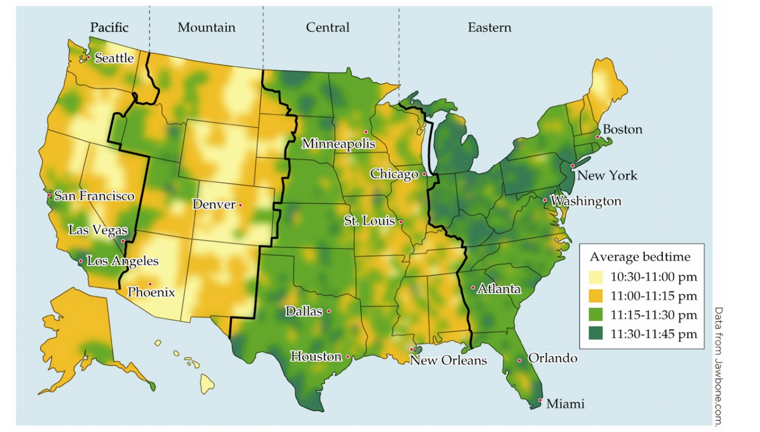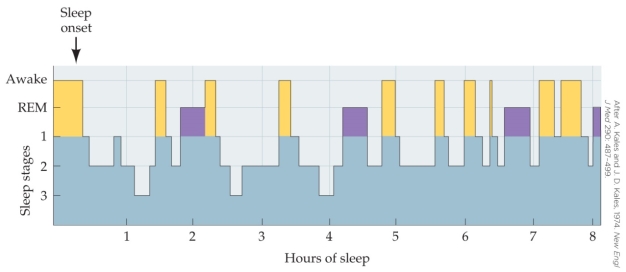Exam 14: Biological Rhythms, Sleep, and Dreaming
Refer to the figure.
 This map supports which of the these observations about circadian rhythms in humans?
This map supports which of the these observations about circadian rhythms in humans?
D
Write a coherent and informative paragraph incorporating each of the following terms or concepts: tau; Clock; free-running rhythms; circadian; ultradian
The circadian clock, also known as the biological clock, regulates the body's internal processes and is driven by the protein tau. This clock controls the body's circadian rhythms, which are the 24-hour cycles that govern our sleep-wake patterns, hormone release, and other physiological processes. These rhythms are not only influenced by external factors such as light and temperature, but also by internal factors, leading to free-running rhythms in the absence of external cues. In addition to circadian rhythms, the body also experiences ultradian rhythms, which are shorter cycles that occur within the 24-hour day, such as the fluctuations in heart rate and hormone levels. Together, these rhythms and the tau protein play a crucial role in maintaining the body's overall health and functioning.
Your friend wants to earn high marks in his French class, but he has limited time to study. What strategy would you recommend?
B
During sleep, if you see high frequency EEG activity in the posterior cortex in the virtual absence of low frequency waves, you can assume that the person is
Name and describe the sleep stages of humans, including descriptions of EEG recordings and behavioral observations for each stage.
Compare sleep patterns across various groups of animals, noting, as appropriate, species differences and the possible evolutionary bases for these differences.
Cats with lesions just ventral to the locus coeruleus sometimes
Stage 2 slow-wave sleep is characterized by distinctive wave patterns in the EEG of 12 to 14 Hz called
It appears that based on findings from EEG of the posterior cortex, dreaming does actually occur during _______sleep.
Describe two of the major sleep disorders, their apparent causes, and the currently available treatments.
Discuss evidence suggesting that there is a genetic molecular pacemaker involved in establishing circadian rhythms and that there are oscillators outside the SCN.
In the typical sleep pattern of healthy young adults, the first REM period of the night may last a few minutes while the last REM period may last
Refer to the figure, showing the typical sleep pattern of an elderly person.
 This pattern shown here is notable because of the
This pattern shown here is notable because of the
During sleep, almost all mammals alternate between two main states: rapid-eye-movement (or REM) and _______ sleep.
Unlike in mammals, in birds, the _______ is sensitive to light and may mediate entrainment of rhythms even after surgical removal of the eyes.
Activity in which part of the cortex most often corresponds with vivid dreaming?
Filters
- Essay(0)
- Multiple Choice(0)
- Short Answer(0)
- True False(0)
- Matching(0)